That Hoarder: Overcome Compulsive Hoarding
Hoarding disorder is stigmatised and people who hoard feel vast amounts of shame. This podcast began life as an audio diary, an anonymous outlet for somebody with this weird condition. That Hoarder speaks about her experiences living with compulsive hoarding, she interviews therapists, academics, researchers, children of hoarders, professional organisers and influencers, and she shares insight and tips for others with the problem. Listened to by people who hoard as well as those who love them and those who work with them, Overcome Compulsive Hoarding with That Hoarder aims to shatter the stigma, share the truth and speak openly and honestly to improve lives.
Episodes
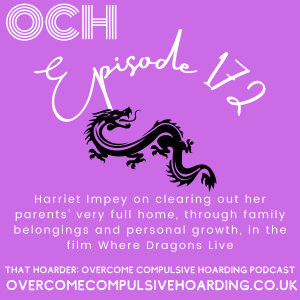
Friday Jan 17, 2025
Friday Jan 17, 2025
Come to a Dehoarding Accountability Zoom Session: http://www.overcomecompulsivehoarding.co.uk/ticket
Subscribe to the podcast: https://www.overcomecompulsivehoarding.co.uk/subscribe
Podcast show notes, links and transcript: http://www.overcomecompulsivehoarding.co.uk/
In today's episode, I chat with Harriet Impey about the complex process of clearing out her parents' cluttered house after their deaths. From unusual family rules to emotional ties with objects, we cover how Harriet navigated the challenges of sorting belongings, her family dynamics, and the personal growth she experienced along the way navigating emotional landscapes.
We also talk about whether her parents hoarded and how their relationship with their stuff has affected her relationship with her stuff. Plus, we discuss the importance of letting go, embracing mindfulness, and the transformative power of therapy.
Trailer: Where Dragons Live: https://www.youtube.com/watch?v=w2ARgzYZei8
Growing up in a cluttered house and realisation later in life
Harriet's mother's attachment to objects and possible hoarding
Influence of family habits on personal behaviour
Relationships and Emotional Awareness
Harriet's journey towards emotional awareness and accepting imperfections
Importance of recognising complex feelings
Managing fear of arguments and expressing anger
Using Objects Instead of Saving Them
Harriet's family preference for keeping items "too special to use"
Transition to using these items with joy
Family Dynamics and Emotional Suppression
Differences in attitudes towards possessions among Harriet and her siblings
Parents' contrasting approaches to objects
Impact of her mother's anxiety on household rules and behavior
Clearing Out Parents' Home
Harriet's responsibility in sorting through parental belongings
Emotional impact of dealing with deceased person's possessions
Reference to "Swedish Death Cleaning"
Importance of considerate item management
Therapy and Self-Reflection
Harriet's 20 years of therapy and its impact
The influence of therapy on personal happiness and self-awareness
Learning to be less rigid in life
Managing and Letting Go of Belongings
Evaluating the necessity of keeping certain belongings
Mindfulness and Mental Health
Mindful self-compassion and ACT
The filming of "Where Dragons Live"
The dual charm and burden of the family home
Personal Experiences and Family Impact
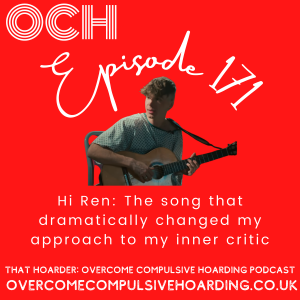
Friday Jan 10, 2025
Friday Jan 10, 2025
Come to a Dehoarding Accountability Zoom Session: http://www.overcomecompulsivehoarding.co.uk/ticket
Subscribe to the podcast: https://www.overcomecompulsivehoarding.co.uk/subscribe
Podcast show notes, links and transcript: https://www.overcomecompulsivehoarding.co.uk/podcast-ep-171-hi-ren-the-song-that-dramatically-changed-my-approach-to-my-inner-critic/
In this episode, I discuss Ren's song "Hi Ren," a mind-blowing exploration of inner conflict that blows apart ideas about the balance between darkness and light within us all. We'll unpack Ren's introspective lyrics, which explore themes like mental illness and creativity, and consider his take on life and what we can learn from it. I share how this song's impact has resonated with my own journey in dealing with grief and the inner critic.
Watch the original song by Ren here: https://www.youtube.com/watch?v=s_nc1IVoMxc&pp=ygUGaGkgcmVu
Impact of "Hi Ren" by Ren Gill on my life
Relation to grief and managing the inner critic
Themes of Strength and Hope
Inner strength and resilience amidst challenges
Inner Conflict
Illness and psychological battles
The pendulum metaphor, advocating acceptance
Universal evil and inner conflict
Dark side as defensive rather than malevolent
Chaos and division as intrinsic parts of self
Identification with 'hope' indicating a shift towards optimism
Life as a Dance
Complexity and humanity over supernatural perfection
Episode contains sensitive topics including swearing, suicide, and mental distress
Song Analysis
Exploration of mental illness and creativity struggles
Connection to personal inner critic experiences
Dialogue between Ren's dark and light personas
Discussion of inner conflict and personal growth
Internal struggle about personal achievements
Dark side's criticism of Ren’s insecurities
Ren’s music achieving 43 million YouTube views
Dark side as a symbol of temptation and negativity
Host's parallel with personal inner critics
Steve Chapman's TED talk on inner critics
Emotional impact of "Hi Ren" song on the host
Dark Ren attacks out of fear and insecurity.
Inner critic misconstrues protection as help.
Inner critic always undermines self-confidence, futile.
Ren's song conveys hope's profound impact.
Embrace change; it's an evolving balance.
Struggling makes us human, imperfect, and relatable.
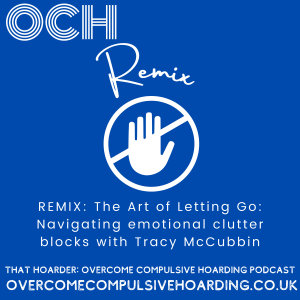
Friday Jan 03, 2025
Friday Jan 03, 2025
Get your 2025 decluttering inspiration calendar: http://www.overcomecompulsivehoarding.co.uk/2025
Come to a Dehoarding Accountability Zoom Session: http://www.overcomecompulsivehoarding.co.uk/ticket
Subscribe to the podcast: https://www.overcomecompulsivehoarding.co.uk/subscribe
Podcast show notes, links and transcript: http://www.overcomecompulsivehoarding.co.uk/
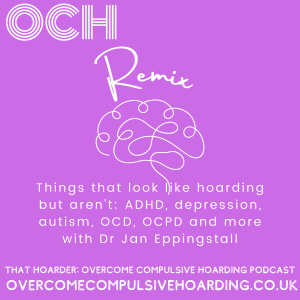
Friday Dec 27, 2024
Friday Dec 27, 2024
Get your 2025 decluttering inspiration calendar: http://www.overcomecompulsivehoarding.co.uk/2025
Come to a Dehoarding Accountability Zoom Session: http://www.overcomecompulsivehoarding.co.uk/ticket
Subscribe to the podcast: https://www.overcomecompulsivehoarding.co.uk/subscribe
Podcast show notes, links and transcript: http://www.overcomecompulsivehoarding.co.uk/
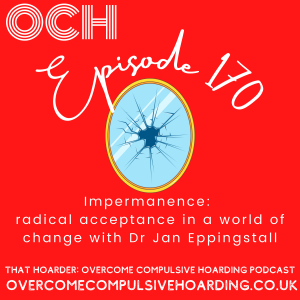
Friday Dec 20, 2024
Friday Dec 20, 2024
Get your 2025 decluttering inspo calendar: http://www.overcomecompulsivehoarding.co.uk/2025
Come to a Dehoarding Accountability Zoom Session: http://www.overcomecompulsivehoarding.co.uk/ticket
Subscribe to the podcast: https://www.overcomecompulsivehoarding.co.uk/subscribe
Podcast show notes, links and transcript: http://www.overcomecompulsivehoarding.co.uk/
Exploring impermanence, this episode highlights how these concepts can help us understand hoarding behaviours and the illusion of control. Looking at impermanence also includes addressing mindfulness, Acceptance and Commitment Therapy, coping with change, ambiguity and uncertainty. Yikes!
Embracing Impermanence
Psychological benefits of impermanence
Concept of "glimmers"
Interplay between mindfulness and impermanence
Fernández-Campos paper on non-judgmental attention
Critique of commercial distortion of mindfulness
Jon Kabat-Zinn’s definition of mindfulness
Practical mindfulness exercises
Mindfulness in Hoarding Context
Psychological dimensions and security from possessions
Environmental Responsibility vs. Hoarding
Personal insights on waste and possessions
Uncertainty, Ambiguity, and Impermanence in Hoarding
Tolerance of uncertainty and ambiguity
Embracing impermanence to reduce distress
Acceptance and Commitment Therapy (ACT) and Hoarding
Psychological flexibility and acceptance of constant change
ACT's promotion of resilience
Use of ACT and Compassion Focused Therapy
Radical Acceptance
Steps to practice radical acceptance
Awareness and curiosity toward challenges
Vocalising Thoughts and Journaling
Benefits of speaking thoughts aloud
Buddhist Concepts and Impermanence
Awareness and acceptance in Buddhism
Tara Brach’s qualities of awareness
Personal Reflections on Change and Relationships
Resisting and coming to terms with change
"Permission Slip" Segment
Concept of Control and Suffering in Hoarding
Desire for permanence leading to hoarding behaviour
Justifications for Keeping Items
Avoiding unnecessary consumption
Ethical decision-making when buying
Increasing Awareness and Understanding Personal Motivations
Promoting curiosity through being without something
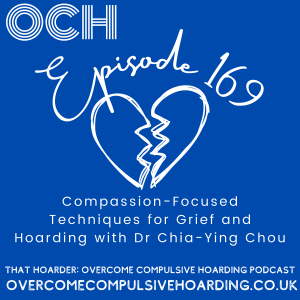
Friday Dec 13, 2024
Friday Dec 13, 2024
Get your 2025 decluttering inspiration calendar: http://www.overcomecompulsivehoarding.co.uk/2025
Come to a Dehoarding Accountability Zoom Session: http://www.overcomecompulsivehoarding.co.uk/ticket
Subscribe to the podcast: https://www.overcomecompulsivehoarding.co.uk/subscribe
Podcast show notes, links and transcript: http://www.overcomecompulsivehoarding.co.uk/
In today's episode, I ask Dr Chia-Ying Chou about the complex interplay between grief and hoarding. We'll explore how emotions like grief can trigger hoarding behaviour, the role an inner critic plays, and learn all about compassion-focused therapy – including why it’s so much easier to offer compassion than to receive it. The timing is perfect, coinciding with National Grief Awareness Week in the UK.
Grief and Hoarding Discussion
Chia-Ying Chou discusses the non-direct link between grief and hoarding based on clinical experience.
Factors such as resistance to grieving and avoiding vulnerability exacerbate hoarding.
Grief can trigger hoarding behaviour to maintain a sense of control and avoid confronting loss.
Host shares personal experiences of how grief intensified their hoarding behaviour.
Grief and Possessions
People keep deceased loved ones' belongings as a way to preserve their existence.
Chou mentions the ambiguous preservation of loved ones through items.
Anxiety and resistance to facing grief make organising or discarding possessions difficult.
Complex Emotions in Grief
Host reflects on the unexpected emotions in grief, like anger or impatience.
Therapeutic Strategies for Grief and Hoarding
Chou compares addressing resistance to grief to preparing for a challenging hike.
Emphasis on resourcing, preparing mentally, and gathering support.
Suggestions for a "baby-step" approach to facing fears and emotions.
Inner Critic and Grief
Host discusses journey with their inner critic and finding new approaches to handle it.
Chou highlights how internal criticism is often related to grief and missed opportunities.
Compassion-Focused Therapy (CFT)
Integration of Western psychotherapy and Buddhist philosophy for addressing psychological challenges.
Difficulty in receiving or directing compassion towards oneself.
Connections Between Hoarding, Trauma, and Grief
Patterns of loss, either tangible or intangible, among those who hoard.
Episode ties with National Grief Awareness Week in the UK.
Cultivating Compassionate Companions
Idea of cultivating an imaginary compassionate companion for emotional support.
Emphasis on emotions being a part of persona, not the true self.
Emotions and Grief Management
Pacing yourself.
Chou recommends creating space for emotions to surface naturally.
Encouragement to welcome emotions as a creative process in internal space.
Examine fears and take small steps to engage with feelings.
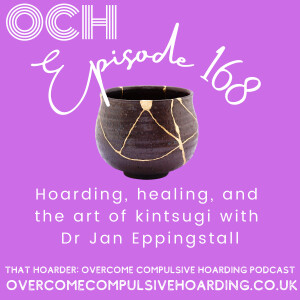
Friday Dec 06, 2024
Friday Dec 06, 2024
Get your 2025 decluttering inspiration calendar: http://www.overcomecompulsivehoarding.co.uk/2025
Come to a Dehoarding Accountability Zoom Session: http://www.overcomecompulsivehoarding.co.uk/ticket
Subscribe to the podcast: https://www.overcomecompulsivehoarding.co.uk/subscribe
Podcast show notes, links and transcript: https://www.overcomecompulsivehoarding.co.uk/podcast-ep-168-hoarding-healing-and-the-art-of-kintsugi-with-dr-jan-eppingstall-of-stuffology/
Today, I'm with Dr Jan Eppingstall, a Melbourne-based counsellor, about the fascinating art of kintsugi and how it connects with hoarding and trauma recovery. We explore how this Japanese tradition of mending broken pottery with gold has lessons for us about the therapeutic journey and the beauty in imperfection. We also discuss how these concepts apply to overcoming perfectionism in hoarding and highlight the empowering process of creating, destroying, and rebuilding.
Introduction to Kintsugi and Dr. Jan Eppingstall
Explanation of kintsugi as a Japanese art form of repairing objects with gold.
Kintsugi and the connection to recovery from trauma.
Kintsugi as a Metaphor for Healing
Importance of acknowledging the process of healing without oversimplification.
Reference to Amy Price's article about kintsugi symbolising care and time.
Discussion of Tomas Navarro's book and the importance of action in healing.
Psychological and Therapeutic Implications
Metaphor in therapy for expressing complex emotions.
Application of kintsugi philosophy in mental health contexts, including trauma recovery.
Relation to Acceptance and Commitment Therapy (ACT), acceptance, and resilience.
The real-life application of acceptance and self-compassion.
Creation, Destruction, and Rebuilding
Create, destroy and recreate art as part of personal healing.
Parallel with kintsugi in wabi sabi / finding beauty in imperfection.
Personal Empowerment and Resilience
Empowerment through courage and resilience using scars as a metaphor.
Resonance with Leonard Cohen
Idea of imperfection as a means for transformation.
Contrasts with Modern Consumerism
Kintsugi and wabi sabi's focus on the beauty of imperfection and impermanence.
Reference to Beth Kempton's book on creating serene, beautiful spaces.
Addressing Perfectionism and Hoarding
Application of kintsugi principles to address perfectionism in hoarding.
Exploration of creating, destroying, and rebuilding as a therapeutic exercise.
"Wreck This Journal" to overcome artistic perfectionism.
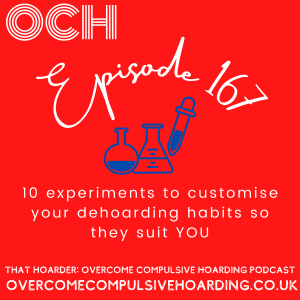
Friday Nov 29, 2024
Friday Nov 29, 2024
Get your 2025 decluttering inspiration calendar: http://www.overcomecompulsivehoarding.co.uk/2025
Come to a Dehoarding Accountability Zoom Session: http://www.overcomecompulsivehoarding.co.uk/ticket
Subscribe to the podcast: https://www.overcomecompulsivehoarding.co.uk/subscribe
Podcast show notes, links and transcript: http://www.overcomecompulsivehoarding.co.uk/
In this episode, I propose ten experiments to help customise your decluttering journey, focusing on individual preferences to uncover what strategies work best in your home. These experiments encourage a flexible approach to dehoarding. It's all about tailoring your methods to fit your style and your personality, ensuring that decluttering becomes a more intuitive and effective process.
Approaching Tasks as Experiments
Tasks viewed as experiments inspired by CBT
Reduction of perfectionist pressure
Emphasis on personal differences and no right or wrong answers
Testing different time slots for tasks
Effectiveness of beginning the day with decluttering
"Swallowing the frog" concept
Long-term goals vs. short-term goals for motivation
Experimentation and Adjusting Over Time
Periodic repetition of experiments to adapt to changes
Use of structured time frames and spontaneous urges to declutter
Experimenting with personal preferences for initiating action
Options such as music, TV, silence, social interaction, or media consumption
Use of podcast as motivational tool
Upbeat music playlist
Group accountability sessions via Zoom for shared motivation
Productivity based on to-do list specificity
Decluttering strategies: by space, type of item, or item within a space
Handling Difficult Categories
Approach to emotionally challenging items
Tailoring strategy based on personal readiness
Consistency in Dehoarding
Short daily durations vs. longer weekly sessions
Finding the best fit based on routine
Time Constraints
Setting strict vs. flexible schedules
Combination of structured and spontaneous efforts
Personalising Decluttering and Productivity Methods
Focus on individual preferences and method effectiveness
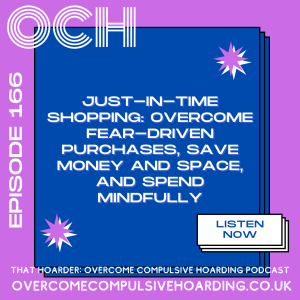
Friday Nov 22, 2024
Friday Nov 22, 2024
Get your 2025 decluttering inspiration calendar http://www.overcomecompulsivehoarding.co.uk/2025
Come to a Dehoarding Accountability Zoom Session: http://www.overcomecompulsivehoarding.co.uk/ticket
Subscribe to the podcast: https://www.overcomecompulsivehoarding.co.uk/subscribe
Podcast show notes, links and transcript: http://www.overcomecompulsivehoarding.co.uk/
In today's episode, I talk about the strategies I've been trying to address over-acquisition and manage my finances, from savings pots to practising 'just-in-time' shopping. I explain how these methods, alongside mindfully resisting impulse buys and more, are helping me reduce clutter.
Personal Financial Management
Dedicated accounts with savings pots for various expenses like glasses, car repairs, and gifts.
Spending limits.
Evaluating the necessity of purchases.
Reflecting on past financial struggles.
The tendency to overprepare due to fear of scarcity.
The impact of hoarding on life, such as emotional pain from bereavements.
The challenge of trusting that resources will be available when needed.
Shopping Habits and Strategies
Emphasising rationality in shopping.
The "just in time" shopping approach to combat over-acquiring.
Mindful shopping techniques
Checking existing supplies before shopping.
Using shopping lists with flexible categories.
Resisting urge-driven purchases like discounts.
Mindful Financial Practices
Exploring alternative uses for money beyond impulse buys.
Prioritising spending on quality experiences.
Past Financial Hardship and Emotional Impact
Past experiences of financial hardship leading to anxiety and hoarding.
Reflecting on the emotional impact from periods like the COVID-19 pandemic.
Personal Growth and Overcoming Beliefs
Encouragement to try despite potential failures.
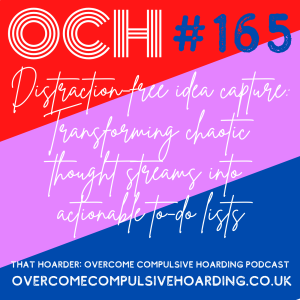
Friday Nov 15, 2024
Friday Nov 15, 2024
Get your 2025 decluttering calendar: http://www.overcomecompulsivehoarding.co.uk/2025
Come to a Dehoarding Accountability Zoom Session: http://www.overcomecompulsivehoarding.co.uk/ticket
Subscribe to the podcast: https://www.overcomecompulsivehoarding.co.uk/subscribe
Podcast show notes, links and transcript: http://www.overcomecompulsivehoarding.co.uk/
Avoiding the chaos of complex idea capture systems is vital for preventing distraction and overwhelm. Today, I'm sharing practical strategies for transitioning from idea capture to action, breaking down large tasks into manageable subtasks and exploring tools like Google Tasks and voice assistants for prioritisation and organisation. Plus, I reflect on my own long-term struggle with to-do lists and how to experiment with different approaches to find a system that suits your needs.
Simplifying Idea Capture
Avoid complex systems to prevent distraction and overwhelm.
Focus on simple, streamlined methods for capturing ideas.
Set dedicated idea capture times to minimise distractions.
Organising Idea Capture Materials
Ensure materials and tools are easily accessible.
Utilise technology for effortless idea capture using voice assistants.
Transitioning from Idea Capture to Action
Prioritise tasks based on urgency, impact, or personal goals.
Structure and prioritise tasks.
Break down large tasks into smaller, manageable subtasks.
Combining Digital and Non-Digital Methods
Use written to-do lists to complement digital systems for immediate tasks.
Essential Elements for an Effective System
Thinker's Notebook's five elements: omnipresence, efficiency, organisation, security, and offline thinking.
Exploring Digital and Non-Digital Tools
Popular digital tools: Evernote, OneNote, ToodleDo, Todoist, Trello, Taiga.io, Google Calendar, Outlook Calendar, Google Tasks.
Non-digital methods: scraps of paper, notebooks, preprinted planners, bullet journals, mind maps.
Personalising the Capture Method
Importance of selecting a method suited to personal preferences and technical comfort level.
Experimentation with different approaches.
Two-Step Strategy for Idea Capture
Combine digital or portable capture methods with comprehensive home organisation tools.
Mind Mapping for Subtasks
Use mind maps to break down tasks, providing a visual representation.
Realistic Time Management
Decide on timings based on deadlines and personal flexibility.
Visual Task Management
Track progress and prioritise tasks using visual tools like checklists or kanban boards.
Prioritisation and Breaking Down Tasks
Organise tasks by priority for easier management.
Divide large tasks into smaller parts for simplification.
Timely Task Execution
Be realistic about time required for tasks and accommodate flexibility.
Psychological Boost from Completion
Mark tasks as completed for a dopamine boost and visual progress tracking.
Adapting Idea Capture Systems
Experiment with various methods to find an effective system that suits personal needs and goals.









